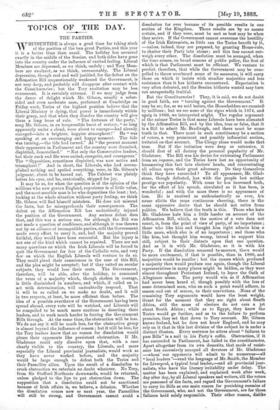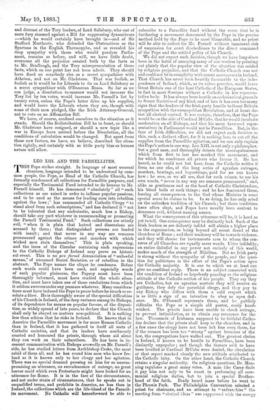TOPICS OF THE DAY.
THE PARTIES.
HITSTJNTIDE is always a good time for taking stock
V V of the position of the two great Parties, and this year it is a better time than usual. The holiday has occurred exactly in the middle of the Session, and both sides have gone into the country under the influence of excited feeling. Liberal Members are depressed, as we think, unduly ; and Tory Mem- bers are exultant, as we think, unreasonably. The Liberal depression, though real and well justified, for the defeat on the Affirmation Bill unquestionably weakened the Government, is not very deep, and probably will disappear after contact with the Constituencies ; but the Tory exultation may be less evanescent. It is certainly extreme. If we may judge from the dance of delight which Mr. Gibson, usually a sober- sided and even moderate man, performed at Cambridge on Friday week, Tories of the highest position believe that the Liberal Ministry is dying, that power is immediately within their grasp, and that when they dissolve the country will give them a long lease of rule. " The fortunes of the party," sang Mr. Gibson, in an irrepressible burst of ecstasy, " so long apparently under a cloud, were about to emerge—had already. emerged—into a brighter, happier atmosphere !" He " was speaking at an encouraging and happy moment. The tide was turning,—the tide had turned." At " the present moment their opponents in Parliament and the country were disunited, dispirited, demoralised." " Not only the Conservative leaders, but their rank and file were united, energetic, and courageous." The " Opposition, sometimes dispirited, was now active and triumphant !" And in short, the Liberals, who had accom- plished nothing and spoiled everything, were, in Mr. Gibson's judgment, about to be turned out. The Cabinet was plainly before his eyes, and he, oratorically, skipped for joy.
It may be so, for when the question is of the opinion of the millions who now govern England, experience is of little value,. and the most sensible man is he who dogmatises the least ; but, looking at the whole situation without party feeling, we think Mr. Gibson will find himself mistaken. He does not misread the facts, but he misapprehends their consequences. The defeat on the Affirmation Bill has undoubtedly injured the position of the Government. Any serious defeat does that, and this was a serious one, for although the Bill was not made a question of confidence, and although it. was thrown out by an alliance of incompatible parties, still the Government made every effort to carry it, and, had the majority proved faithful, they would have been successful. But the injury is not one of the kind which cannot be repaired. There are not many questions on which the Irish Liberals will be forced to quit the Government for fear of the Catholic vote, and very few on which the English Liberals will venture to do so. They could plead their consciences in the case of this Bill, and the plea might be accepted; but if they ratted on secular subjects, they would lose their seats. The Government, therefore, will be able, after the holiday, to command the votes of a majority which, though shaken in courage, is little diminished in numbers, and which, if called on to act with determination, will undoubtedly respond. That it will be so called on we make no doubt, and it will in two respects, at least, be more efficient than before. The idea of a possible overthrow of the Government having been spread abroad, every vote will be watched, and Liberals will be compelled to be much more cautious in deserting their leaders, and to work much harder in forcing the Government Bills through. At the same time, the obstruction will be less. We do not say it will be much less, for the obstructive group is almost beyond the, influence of reason ; but it will be less, for the Tory leaders know that no reason for dissolution would please their opponents like persistent obstruction. If Mr. Gladstone could only dissolve upon that, with a case clearly visible to the country, the Liberals, and more especially the Liberal provincial journalists, would work as they have never worked before, and the majority would be large enough to defeat both the Tories and their Parnellite allies. Upon the result of a dissolution to crush obstruction we entertain no doubt whatever. No Tory, from Sir Stafford Northcote downwards, would be returned, unless pledged to the lips to put obstruction down. The supposition that a dissolution could not be sanctioned because of Irish affairs is, we believe, a delusion. Whether the dissolution comes now or ilext year, the Parnellites will still be strong, and Government cannot avoid a dissolution for ever because of its possible results in one section of the Kingdom. Those results are by no means certain, and if they were, must be met as best may be when they arrive. If the Government cannot overcome the hostility - of the Irish Extremists, as little can the Tories benefit by it, —unless, indeed, they • are prepared, by granting Home-rule,. to shatter their Party into atoms ; and this fear cannot out- weigh every other. The dissolution must be arranged, when the time comes, on broad reasons of public policy, the first of which is that Parliament must be efficient. We venture to predict, therefore, that while the Government may be com- pelled to throw overboard some of its measures, it will carry those on which it insists with steadier majorities and less' resistancethan it has hitherto encountered. Expectation is. very often defeated, and the Session hitherto wasted may turn. out unexpectedly fruitful.
But the Constituencies? They, it is said, we do not doubt in good faith, are " turning against the Government." It may be so; for, as we said before, the Householders are countedi by millions ; but we see none of the signs which in 1874, and agaie. in 1880, we interpreted aright. The regular argument of the calmer Tories is that many Liberals have been alienated by the Affirmation Bill, and by the idea, true or false, that it is a Bill to admit Mr. Bradlaugh, and there must be some truth in that. There must in each constituency be a section, of voters, a very prominent and possibly influential section,. irritated on that account. The Clergy alone would make that true. But if the irritation were deep or extensive, it should first of all destroy the personal popularity of Mr.. Gladstone. The Bill was his device for extricating Parliament from an impasse, and the Tories have lost no opportunity of hammering this fact into electors' heads, and concentrating all odium upon their great adversary. Do they themselves.
think they have succeeded To all appearance, Mr. Glad- stone, though defeated, has with the people lost neither prestige nor popularity. With some he his increased both, for the effect of his speech, circulated as it has been, is wonderful; and with the mass there is no appearance of loss. He is received as enthusiastically as ever, his. name• elicits the same continuous cheering, there is the- same oppressive desire that he should not retire from politics. We believe that the truth is this. Those who hate Mr. Gladstone hate him a little harder on account of the Affirmation Bill, which, as the motive of a vote does not count, is, from the point of view of party, of no importance ;. those who like him and thought him right admire him a. little more, which also is of no importance ; and those who• like him, but thought him wrong, intend to support him, still, subject to their distaste upon that one question. And as it is with Mr. Gladstone, so it is with his Party. If the dissolution occurred to-morrow, there would be more excitement, if that is possible, than in 1880, and majorities would be smaller ; but the causes which produced a majority then would produce one again, though the Liberal representatives in many places might be bidden, as they were almost throughout Protestant Ireland, to leave the Oath of Allegiance alone. The party would win as if Affirmation had never been heard of, though possibly with the loss of some determined men, who on such a point would adhere, in season and out of season, to their convictions. . None of the remaining Tory arguments would have the least weight. Grant for the moment that they are right about South Africa, still the mass of electors do not care a jot about South Africa ; while as to Egypt, they know the Tories would go further, and as to the failure to perform promises, they set that down to Tory account. Mr. Gibson knows Ireland, but he does not know England, and he may rely on it that in this last division of the subject he is under a distinct illusion. Every sentence he utters about " failures to pass Bills" is a nail in his Party's. coffin. Obstruction, if it has succeeded in Parliament, has failed in the constituencies. Apart altogether from its own demerits, that mode of resist-. ance has excessively annoyed all devotees of Mr. Gladstone —whom— our opponents will admit to be numerous—all "local leaders "—read the language of Mr. Smitb, the Member for Liverpool, a typical local leader,—and all provincial jour- nalists, who have the literary irritability under delay. The matter has been explained, and explained, week after week, day after day, by all Liberal speakers and writers, till the voters are possessed of the facts, and regard the Government's failure to carry its Bills as one main reason for punishing enemies of the Government, who, and not the Government, are for those 'failures held solely responsible. Their other reason, dislike and distrust of the Tory leaders, of Lord Salisbury, who out of mere fury stormed against a Bill for suppressing dynamiteurs —which he would certainly have brought in—and of Sir Stafford Northcote, who defended the Obstructives as the Spartans in the English Thermopylae, and so revealed his deep sympathy with those who would paralyse Parlia- ment, remains as before, and will, we have little doubt, overcome all the prejudice created both by the facts as to Mr. Bradlaugh, and the Tory misrepresentation of those facts, which on one point has not been adroit. They should have fixed on somebody else as a secret sympathiser with Atheism, and not on Mr. Gladstone. That was foolish, as foolish as it would he for Liberals to fix on Lord Salisbury as a secret sympathiser with O'Donovan Rossa. So far as we can judge, a dissolution to-morrow would not increase the Tory list by ten votes, would increase Mr. Parnell's list by twenty votes, unless the Pope's letter dries up his supplies, and would leave the Liberals where they are, though with some of their men pledged, like the Irish Attorney-General, not to vote on an Affirmation Bill.
We have, of course, confined ourselves to the situation as it stands. Should the Redistribution Bill be in front, or should Mr. Gladstone have resigned, or should a new topic like a war in Europe have arrived before the Dissolution, all the conditions of calculation would be changed. But apart from those new factors, we have, we believe, described the situa- tion rightly, and certainly with as little party bias. as human nature will allow.



































 Previous page
Previous page